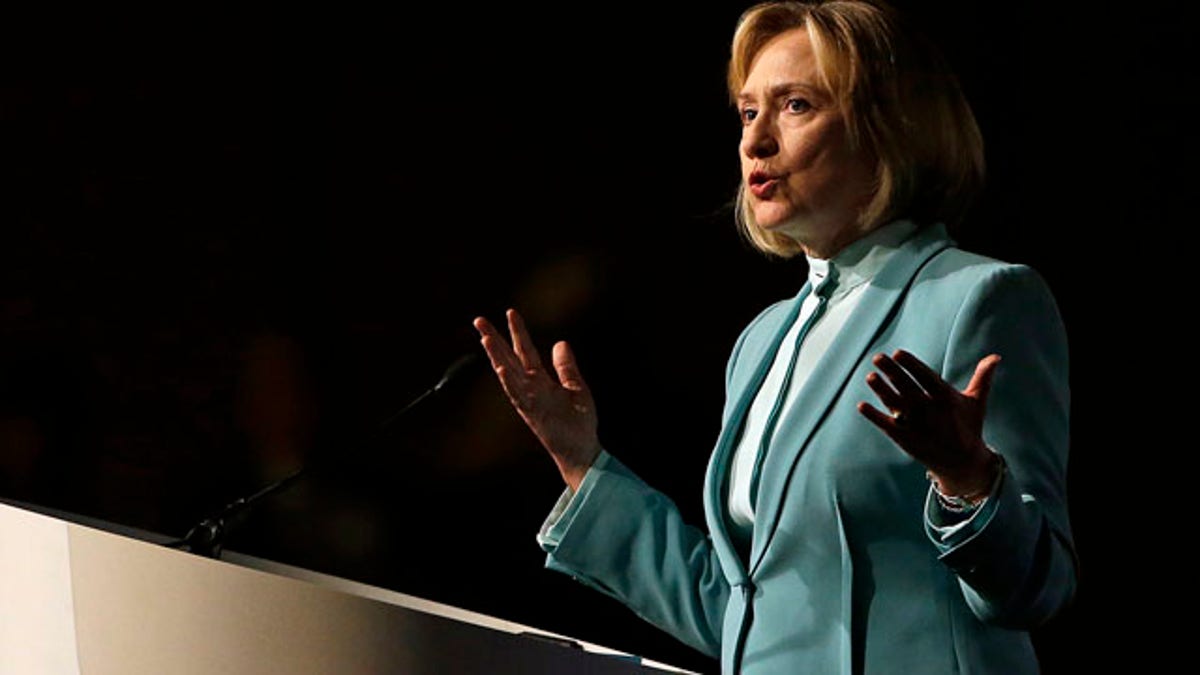
FILE: Aug. 12, 2013: Former Secretary of State Hillary Clinton speaks to the American Bar Association Annual Meeting, in San Francisco, Calif. (AP)
2016 is in the air.
Vice President Joe Biden is heading to Iowa next month to be the keynote speaker at Senator Tom Harkin’s steak fry fundraiser, an event that often showcases speakers aspiring to be president.
Things are heating up, too, on the Republican side with the latest war of words between Governor Chris Christie and Senator Rand Paul; discussion of Senator Ted Cruz and Marco Rubio’s chances; questions as to whether Congressman Paul Ryan will be mounting another campaign and whether a centrist like Senator John McCain or Mitt Romney will be the choice once more.
But with all these question marks swirling around the wide field for 2016, there remains one forgone conclusion amongst pundits on both sides. If Hillary Clinton wants the nomination, it’s hers for the taking.
[pullquote]
Indeed, she holds a substantial lead in polls against her most likely Democrat opponent, Joe Biden. According to a new Rasmussen poll, 39 percent of those surveyed said that if the 2016 Democratic primary were held today they would want Clinton as compared to 7 percent for Biden. And while there are many who are not interested in having Clinton as the nominee – 27 percent said that she was their least favorite candidate – it is clear that she is the one to beat.
Clinton not only leads the Democratic field in polls, but also leads potential Republican challengers. In fact, a new PPP poll shows that Clinton could make Georgia a swing state. She leads Rand Paul, Paul Ryan, Jeb Bush and Chris Christie in a head-to-head in the Peach State. And she has been collecting praise from Republicans including Newt Gingrich who said that the GOP is “incapable of competing” in 2016 if she is the nominee.
Though it looks as if Clinton should run away with the nomination, she faces a series of challenges that she must address if she is to be the next president of the United States.
First and foremost, Clinton will have to contend with President Obama’s sinking approval ratings. Just last week he suffered his largest dip in the last two years: 7 points in one day.
His press conference on Friday did little to raise confidence in his and his administration's ability to manage the fallout from Edward Snowden’s leaks and an overreaching NSA, the upcoming fiscal battle with House Republicans, foreign policy especially vis-à-vis Russia, not to mention getting the economy back on track.
In order to separate herself from Obama’s legacy – which is increasingly in doubt – Clinton must systematically address the economy and jobs in a way that resonates with a frustrated electorate. As it stands, 52 percent of Americans think the economy is in recession. And unemployment sunk to 7.4 percent in August.
The president has been emphasizing economic policies for the middle class as he tours the U.S., but has given very few details as to how he will promote economic growth and create jobs.
It follows that the central theme of the Clinton reemergence must be revitalizing the economy with a coherent set of pro-growth policies.
We need to see incentives for businesses to invest; tax code reform; a plan to facilitate the continued vitality of Medicare, Medicaid, and Social Security. And perhaps most of all we need a plan to balance the federal budget as we face another government shutdown on October 1.
A successful Clinton run for the White House will most certainly have to highlight the unity and singularity of the American experience in promoting a new and attainable American dream.
We have seen far too much division in Washington politics – from both sides of the aisle and the president himself. With strong support in the minority community, amongst young voters and moderates and independents, Clinton has the chance to be the great unifier that we need so badly by promoting policies that benefit everyone.
To be sure, Clinton has everything going for her right now. But she also has her work cut out for her.
She must tread carefully, defining herself as distinct from President Obama while still showing support for an agenda that she will be inexorably linked to from her time as Secretary of State, especially vis-à-vis foreign policy.
2016 is Clinton’s for the taking, but only if she can put forward a set of policies that show she is thinking not like a Democrat or Republican but as an American.








































